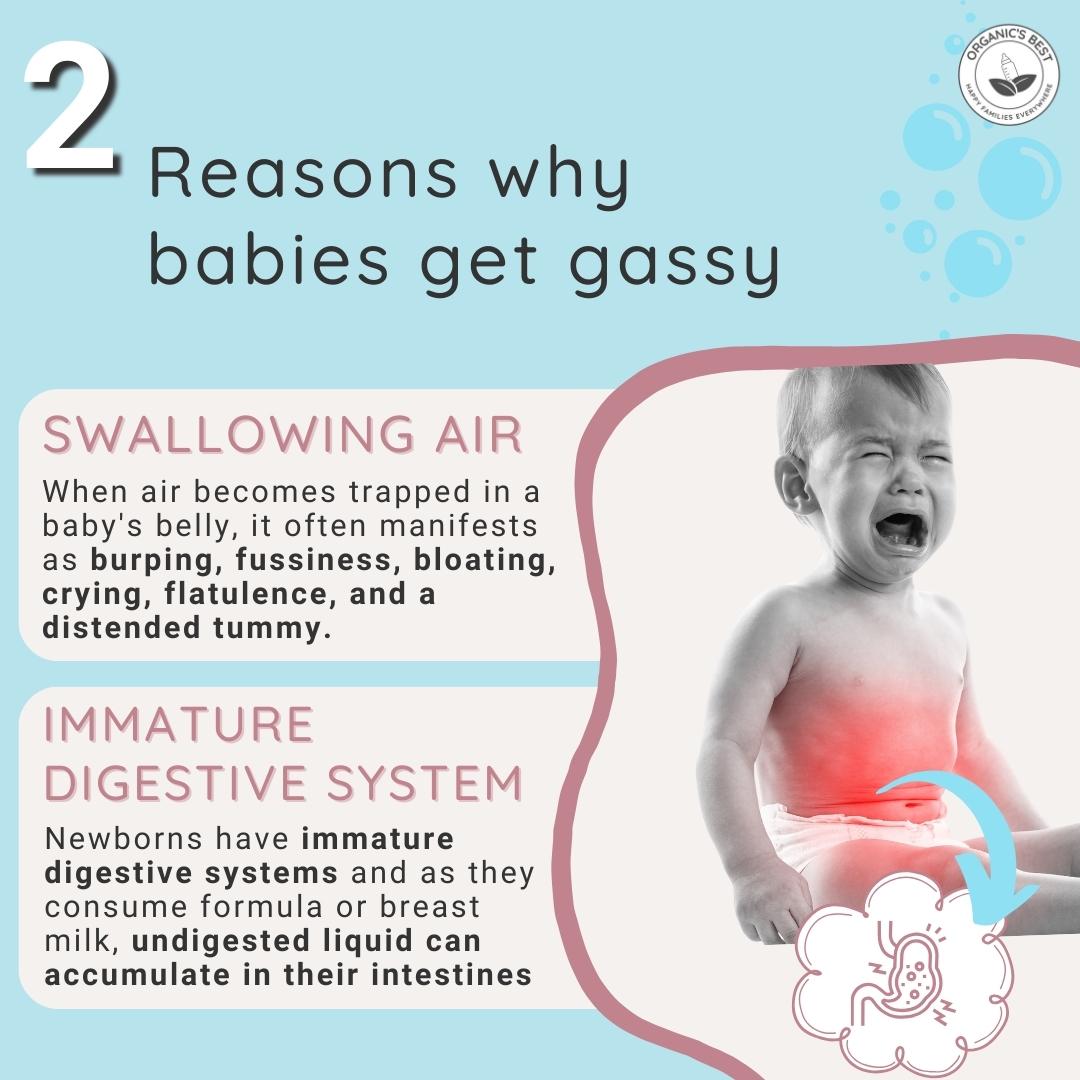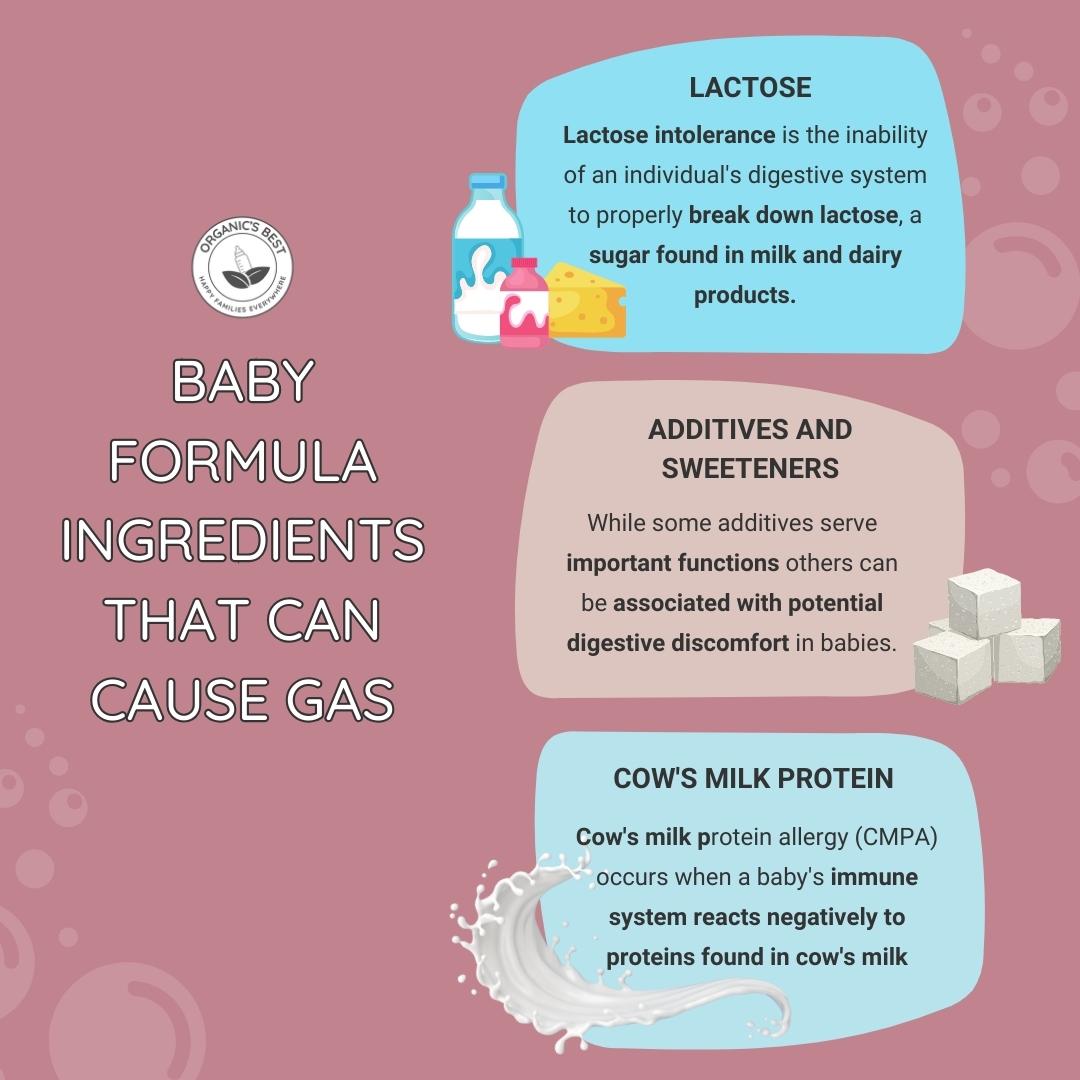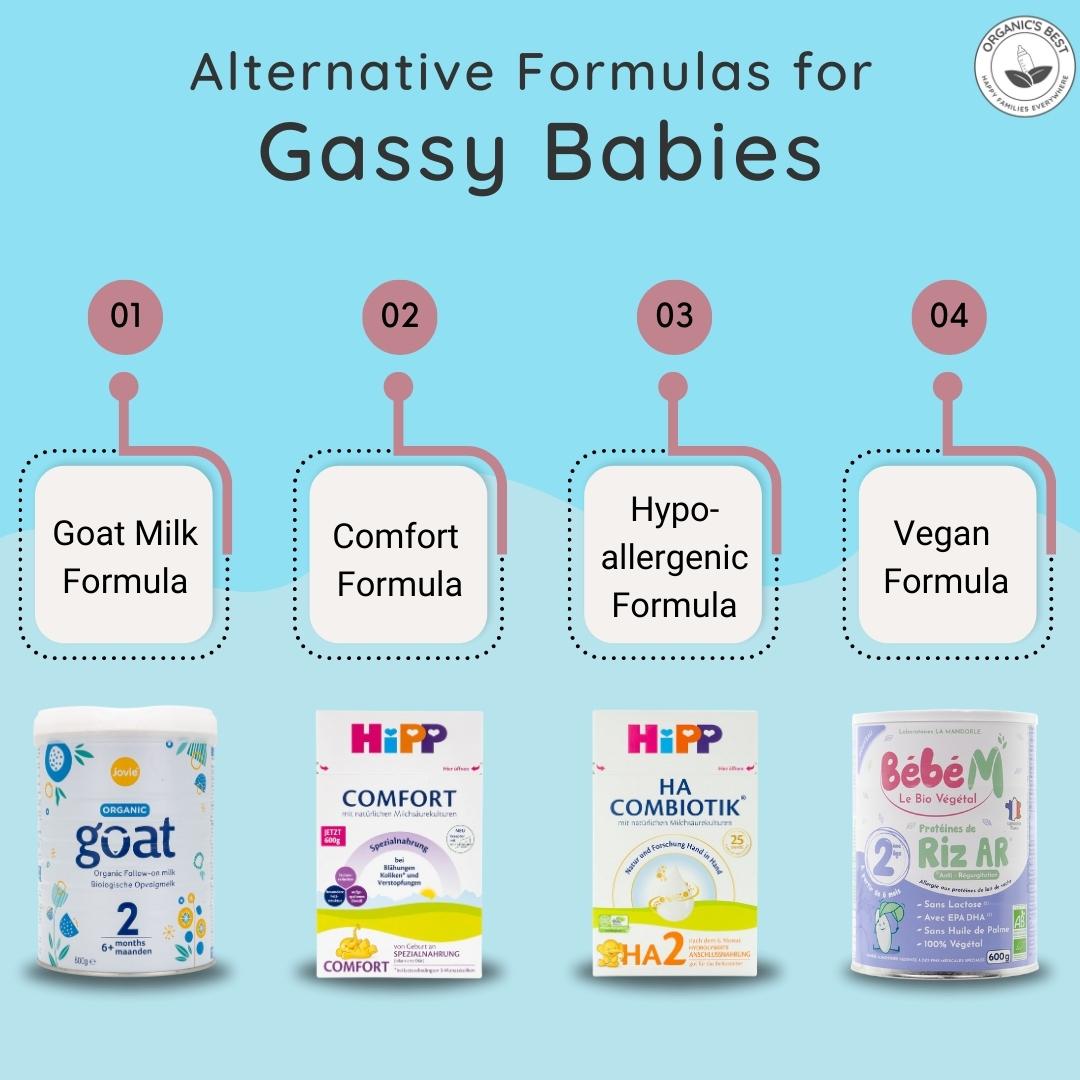Click to Get 2 FREE Boxes/Cans
Click to Get 2 FREE Boxes/Cans
Only New Customers! Click HERE to Get 2 Extra Boxes/Cans for Free With Your First Order.
Only New Customers! Click HERE to Get 2 Extra Boxes/Cans for Free With Your First Order.
BABY FORMULA
Offering new parents top-quality European infant formula from renowned brands like HiPP, Holle, Kendamil, and more. If you’re uncertain about which product to choose, our Formula Finder can help you make the best decision for your baby.
Baby Food
Offering new parents a premium selection of European baby foods, including jars, pouches, cereals, and snacks from esteemed brands like HiPP and Holle.
When to Switch Formula Because of Gas
by Agustina Fernandez January 30, 2024 9 min read

Have you ever wished your little one came with a troubleshooting guide? Especially when their gas levels skyrocket? Well, you're not alone. Parenthood is a journey filled with unforgettable moments of joy; however, it also presents its fair share of challenges, and one of the most common issues many parents face is dealing with gassy babies.
The relentless cries, uncomfortable squirming, and sleepless nights caused by a gassy infant can leave even the most experienced caregivers feeling helpless. It's a dilemma that every parent encounters at some point, and it can raise the question of whether it's time to switch formulas.
Join us as we explore the world of gassy babies, the potential causes of their discomfort, and the crucial decision of when to switch formula because of gas!
Table of contents
- Understanding Baby Gas: It's More Common Than You Think
- Telltale Signs Your Baby Formula Might Be the Culprit
- Potential Formula Ingredients That Can Cause Gas
- Other Factors to Consider Before Switching Baby Formula
- Home Remedies & Techniques to Alleviate Gas
- Alternative Sensitive Baby Formula to Consider
- Trials & Transitions: How to Safely Switch Formulas
Understanding Baby Gas: It's More Common Than You Think
Babies are known for their adorable coos and soft giggles, but they are equally infamous for their bouts of infant gas. But why does this happen?
Why do babies get gassy?

There are a couple of key reasons for this phenomenon:
-
Swallowing Air: Babies have a multitude of opportunities to ingest air, whether it's during bottle feeding while sucking on a pacifier or during bouts of crying. When too much air becomes trapped in a baby's belly, it often manifests as gas bubbles, which can lead to burping, fussiness, bloating, crying, flatulence, and a bloated tummy.
-
Immature Digestive System: Newborns have immature digestive systems, and as they consume formula or breast milk, undigested milk or formula can accumulate in their intestines. The natural gut bacteria process this undigested food, producing gas as a byproduct.
The challenge lies in the fact that newborns struggle to expel this gas efficiently. Your baby may contort their little body, grunt, turn red, wake up from deep slumber, or even cry loudly until they finally produce those resounding burps and farts.
Another factor contributing to gassy babies is hypersensitivity, whether to baby formula or elements in the maternal diet that make their way into breast milk. So how can you tell if baby gas is just run of the mill or the result of their baby formula? We'll cover this next!
Common infant gas vs side effects for your baby's formula
If your baby is feeding well, gaining weight appropriately, and passing soft, non-alarming stools (green, yellow, or brown – but not bloody, white, or black), then the grunting, straining, and crying associated with gas are typically harmless. These symptoms don't necessarily imply that your baby has a digestive problem or intolerance to milk or formula.
Importance of monitoring and understanding signs
However, if your baby's fussiness, squirming, and other gassy behaviors persist beyond the initial few months, it's essential to consider that their gassiness may be one of the side effects of food allergies or intolerance. A key indicator is when other significant health issues accompany these gas-related symptoms.
A little spit-up or gas is generally considered normal and not necessarily a reason to rush to the store for a different formula. However, if you observe the following signs, it might be wise to have a conversation with your pediatrician about switching baby formula:
-
Large amounts of spit-up after feeding.
-
Fussiness and excessive crying following feedings.
-
Projectile vomiting.
-
Bloody stool.
-
Lack of weight gain or significant weight loss.
Telltale Signs Your Baby Formula Might Be the Culprit
This section explores key indicators that can help you determine if your chosen formula is causing discomfort or digestive issues in your little one.
Excessive Fussiness Post Feeding: If your baby becomes notably fussy and irritable immediately after feedings, it could be a sign that the formula they are consuming is causing them discomfort.
Bloated Tummy and Hard Belly: A bloated or distended tummy, coupled with a hard abdominal area, can suggest that the formula may not agree with your baby's digestive system.
Disturbed Sleep Due to Discomfort: If your baby struggles to sleep peacefully and consistently due to discomfort, particularly after feedings, it may be an indicator that the formula is causing digestive distress.
More Frequent Spit-ups or Vomiting: An increase in the frequency and volume of spit-ups or even projectile vomiting can be a signal that the formula is not settling well in your baby's stomach.
Change in Stool Patterns: Any notable alterations in your baby's stool patterns, such as unusual color, consistency, or the presence of blood, can be linked to formula-related issues.
Potential Formula Ingredients That Can Cause Gas

Some ingredients in baby formulas are more likely to cause digestive discomfort than others. Let's talk about what some of those ingredients are and why they may lead to tummy troubles.
Lactose:
Lactose intolerance is the inability of an individual's digestive system to properly break down lactose, a sugar found in milk-based and other dairy products. It occurs when there is a deficiency or absence of an enzyme called lactase, which is responsible for digesting lactose.
Symptoms of an intolerance to lactose include:
-
Gas
-
Bloating
-
Diarrhea
-
Fussiness after feedings
Cow's Milk Protein:
Cow's milk protein allergy (CMPA) occurs when a baby's immune system reacts negatively to proteins found in cow's milk. CMPA can manifest in various ways, often with more severe symptoms than lactose intolerance, because it evokes an immune response.
Symptoms of CMPA in babies may include:
-
Colic
-
Vomiting
-
Diarrhea
-
Skin rashes
-
Blood in the stool
-
Respiratory problems
Additives and Sweeteners:
The role of additives and sweeteners in infant formula is a complex and evolving subject. While some additives serve important functions, such as enhancing nutrient absorption or maintaining the shelf life of the powdered formula, others can be associated with potential digestive discomfort in babies.
For example, certain artificial sweeteners, like sucralose or aspartame, have raised concerns about their effects on an infant's digestive system. Additionally, some babies may be particularly sensitive to certain additives, preservatives, or artificial flavors.
It's important to read formula labels carefully and consult with your baby's pediatrician if you have concerns about specific additives or sweeteners, as they can help advise on whether your baby may need a formula switch due to these ingredients.
Other Factors to Consider Before Switching Baby Formula
While formula selection is an important consideration when addressing baby gas, several other factors can contribute to or exacerbate these issues.
Before making the decision to switch formulas, it's crucial to explore and address these factors:
1) Ensuring Proper Feeding Techniques
Before jumping to a formula change, take a close look at the way you're feeding your baby. Proper feeding techniques during breastfeeding and bottle feeding can significantly impact how much air your baby ingests during meals.
Ensure that your baby is positioned correctly during feeding, with their head slightly elevated, to help reduce air intake. Additionally, burping your baby frequently during and after feedings may help expel any trapped air bubbles.
2) Checking the Bottle's Nipple Flow
The flow rate of the bottle's nipple can influence the pace at which your baby drinks and swallows. If the flow is too fast, your baby might ingest too much air along with the milk, leading to gas bubbles and discomfort. Conversely, a flow that is too slow can frustrate your baby, causing them to swallow more air out of impatience.
Learn More: Best Bottles for Breastfed Babies
3) Environmental Factors
Sometimes, external factors in your baby's environment can contribute to gas-related discomfort. These factors may include exposure to allergens or other irritants in the air. Additionally, changes in temperature or pressure can affect your baby's digestion.
Home Remedies & Techniques to Alleviate Gas
It's important to be aware that dealing with a gassy baby doesn't always necessitate a formula change. There are several effective home remedies and techniques that can help remedy your baby's gas problems:
1. Gentle Tummy Massages: Using your fingertips, apply light pressure in a circular motion on your baby's tummy. This can help to stimulate the movement of gas through the digestive tract and provide relief from bloating and gas pains.
2. Correct Burping Techniques: Proper burping is essential for helping most babies expel trapped air after feeding. Make sure to burp baby by gently patting or rubbing their back, holding them against your shoulder, or sitting them upright. Experiment with different burping techniques to find what works best.
3. Warm Baths and Bicycling Legs: Warm water helps relax muscles and ease tension in the abdominal area, which can facilitate gas release. Additionally, the "bicycling" of your baby's legs, where you gently move their legs in a cycling motion, can aid in moving gas through the digestive system.
Discover even more solutions for relief here!
Alternative Sensitive Baby Formula to Consider
Different formulas are designed to address specific issues, and it's crucial to choose the one that aligns with your baby's unique requirements. Here are some baby formula categories and their respective European products known for their gentle touch, along with insights on when they can be beneficial or when they may not be appropriate:
Goat Milk-Based Formula - Jovie
Goat milk proteins are smaller and easier to digest than cow's milk proteins, making goat-based formula beneficial for babies who have difficulties with cow's milk-based formulas but who do not have lactose intolerance or CMPA.
Jovie's organic whole goat milk formula boasts a blend enriched with vital prebiotics and stands proudly free from chemicals, pesticides, antibiotics, and GMOs.
Comfort Formula - HiPP Comfort
Comfort formulas are designed to ease gastrointestinal issues like colic and fussiness, making them a helpful solution for some babies. However, comfort formula is not suitable for babies with diagnosed lactose intolerance or cow's milk protein allergies.
HiPP Comfort formula contains partially hydrolyzed milk proteins and reduced lactose content, which can significantly reduce gastrointestinal symptoms and crying in babies. It is also enriched with prebiotics and probiotics for added digestive health support.
Hypoallergenic Formula - HiPP HA (Dutch/German)
Hypoallergenic (HA) formulas contain extensively hydrolyzed milk proteins and are intended for babies with milk protein sensitivities.
HiPP HA formula is specially formulated to reduce allergenicity and is enriched with prebiotics and probiotics. These formulas are designed to minimize the risk of allergic reactions in infants with milk protein sensitivities.
HiPP HA formula is not suitable for babies with lactose intolerance or lactose sensitivity as it is lactose-based. Additionally, if your little one has a diagnosed or suspected cow's milk protein allergy, then HiPP HA may not be suitable.
Vegan Formula - Bebe M
Vegan formulas may be suitable for babies with lactose intolerance or cow's milk protein allergy who require dairy-free options. Bebe M's vegan formula is made with organic rice protein hydrolysate, free from allergens such as milk, dairy products, gluten, soy, and nuts. It is also thickened with carob gum and starch for anti-reflux support.
Bebe M may be beneficial for infants with CMPA, lactose intolerance, or excessive regurgitation and is ideal for those who require a plant-based, low-allergen option.
You can also check out our Best Formula for Gassy Babies collection page for in-depth guidance and product details.
Trials & Transitions: How to Safely Switch Formulas
Switching formulas is a process that requires care and attention to ensure your baby's comfort and well-being. Here's a guide on how to safely transition to a new formula:
The Gradual Switch Method

When transitioning to a new formula, the gradual switch method is generally recommended as it gives your baby's digestive system the ability to adapt.
Follow these steps for a smooth transition:
-
Days 1-3: Start with a mixture of 25% new formula and 75% old formula in your baby's bottle.
-
Days 4-6: Adjust to a 50% new formula and 50% old formula ratio.
-
Day 7: Transition to a mixture of 75% new formula and 25% old formula.
-
By the beginning of the second week, exclusively use the new formula for all feedings.
When changing baby formula, remember to closely observe your little one for any signs of discomfort, such as fussiness, gas, diarrhea, or constipation. Keeping a feeding diary can be a valuable tool during the transition period. During the formula switch, record details about your baby's feedings, including the type of formula, the amount consumed, and any reactions or symptoms observed. If you notice any adverse reactions, consult your pediatrician for guidance.
Conclusion: When to Switch Formula Because of Gas
Your baby's well-being thrives on your ability to recognize and respond to cues like fussiness, gas, and digestive issues, allowing you to take the necessary steps to ensure their comfort. While parental instincts play a vital role in caring for your baby, it's equally crucial to balance them with knowledge and expert advice. Trust in your intuition and the expertise of your healthcare team to make the best decisions for your little one's health and nutrition.
Disclaimer:
Please be aware that this information is based on general trends in babies, and it is not medical advice. Your doctor should be your first source of information and advice when considering any changes to your child’s formula and when choosing your child’s formula. Always consult your pediatrician before making any decisions about your child’s diet or if you notice any changes in your child. Breastfeeding is the best nutrition for your baby because breast milk provides your child with all the essential nutrients they need for growth and development. Please consult your pediatrician if your child requires supplemental feeding. |
Agustina Fernandez
Dr. Agustina Fernandez earned her medical degree from the prestigious Universidad Nacional de Córdoba, Argentina. With a deep-rooted passion for pediatrics, Dr. Fernandez is currently on the path to specializing in children's healthcare. Recently, she has delved into the vital field of infant nutrition. Her research interests include breastfeeding, infant formula, and baby food in little ones’ formative years. Dr. Fernandez's commitment to this area of study underscores her dedication to ensuring the health and well-being of children from their earliest days.
Leave a comment
Comments will be approved before showing up.
Also in Organic Infant Nutrition and Health Blog

10 Winter Activities for Kids and Toddlers
by Agustina Fernandez January 06, 2026 8 min read
Read More
How to Choose The Best Infant Formula: A Guide to EU Organic Formulas
by Agustina Fernandez January 05, 2026 14 min read
Read More
Best Formula for Breastfed Babies 2026 Guide
by Agustina Fernandez January 05, 2026 15 min read
Read More
Reviewed by Dr. Bardha Citaku, MD
-

Dr. Bardha Citaku: Medical Reviewer of Organic's Best Blog
Dr. Bardha Citaku completed her medical studies at the University of Prishtina in Kosovo, where she began her journey into the field of medicine. She has since developed a career in medical research, contributing to projects with notable organizations, including the World Health Organization (WHO).

